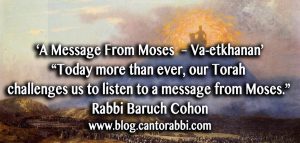A MESSAGE FROM MOSES – Deut.3:23—7:11 – Va-etkhanan –by Rabbi Baruch Cohon
This week’s reading is long, starting as Moses recalls praying to be permitted to enter the Promised Land. He is refused, but he accepts his fate, and then turns to remind his people why they are called a “wise and understanding nation.” It is because of the laws they follow, the Torah they received at Sinai. That’s where they showed they could listen. Mitzva was the message, and they accepted it. Reviewing their progress from slavery in Egypt to nationhood, Moses cautions them to keep the Law.
Then he attends to a matter of administration. He designates Cities of Refuge, where a fugitive killer can go and be safe – if the killing was accidental and not premeditated. This is just a reminder. The same Cities of Refuge were described completely two weeks ago.
Now Moses launches into his second oration to his people. Yes, it is long. Only part of it is read this week. Long, but worth reading. Both dramatic and basic to our understanding of Judaism, this section of Moses’ oration includes:
(1) a repetition of the Ten Commandments, with some brief comments added. We might well note that the Big Ten are not called commandments in Hebrew. They are aseret hadibrot – “ten statements.” Simple principles of right and wrong, universal truths, not limited to any one religion — the truths our ancestors accepted at Mount Sinai. The same ones that our American neighbors liked to post in public buildings. Unless…unless some Bible-haters pass laws to ban them.
(2) Sh’ma –“Hear O Israel,” the central declaration of Jewish faith. I have some notes on the Sh’ma from my father Rabbi and Professor Samuel S. Cohon of blessed memory, a longtime teacher of rabbis. He points out that the very wordsh’ma means both to hear and to understand. The ensuing text lists ways we can achieve true understanding: our relationship to the Divine, our learning and teaching of that relationship, dramatizing it through signs and symbols like T’fillin and Mezuzot, and our goal – to make our lives praiseworthy.
(3) the duty to remember the Exodus from Egypt, the primal victory of physical independence that opened the way to moral and spiritual identity.
And finally,
(4) a warning not to be tempted by mixed marriage and idolatry.
Pitfalls await the conquering Israelites, and Moses describes them vividly. They will take over great cities that they did not build. They will inhabit fine houses full of good things they did not produce.
Maybe the so-called “seven nations” they are replacing knew something they didn’t know? Maybe those tribes had a better way of life?
Forget it, he tells them: “Not because you outnumbered all the other nations did G-d value you and choose you. You are the smallest of the nations. Because G-d loved you, that’s why He rescued you from Egypt.”
Today some people still ask: Why are Moses’ heirs still here? Why did Jews survive all their defeats, the exile and persecution and genocide?
Not because there were more Jews in the world than there were Egyptians or Greeks or Romans or Huns or Turks. Still a global minority, we are still able to listen. Granted, we can listen to the wrong voices. So we still sometimes get tripped up by idolatries from Communism to Scientology. Today more than ever, our Torah challenges us to listen to a message from Moses.
If you read the whole Sedrah every week, more power to you. If not, take the time to read this one. And since this week included the Ninth of Av when we fast to mourn the destruction of the Temple twice on the same date, take a look at the beautiful Haftorah, the prophetic passage that gives its name to this Sabbath – Shabat Nachmu – the Sabbath of Comfort, as Isaiah sings: “Comfort, comfort my people, says your G-d.”
Wishing you a week of strength and comfort, Shabat Shalom.



